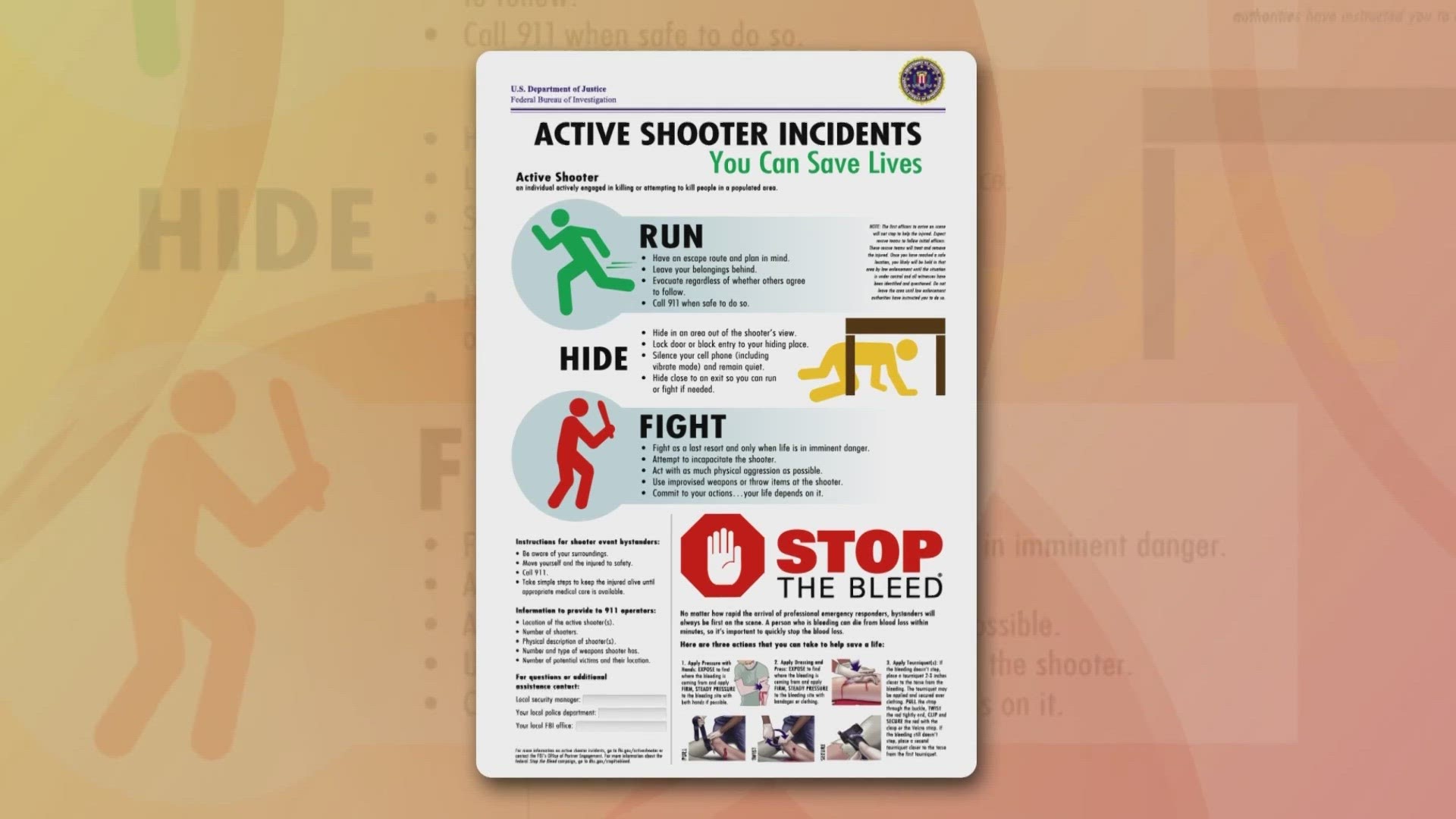CLEVELAND — As the nation continues to deal with mass shootings, knowing what to do when a shooter opens fire can mean the difference between life and death.
"The average police response time in America is three minutes, so those that are on the inside are going to be on their own," FBI Special Agent John Breen says. "They're going to have to take action to save their lives and the lives of others."
Breen leads active shooter trainings teaching people how to survive. According to a 2014 FBI Active Shooter Study identifying 160 active shooter incidents between 2000 and 2013, 60% of those incidents ended before police arrived.
"These events, they unfold so quickly, and they are so complex that I can't give you a cookie cutter solution," Breen told 3News. "But what we can give you is a strategy,"
The FBI promotes "Run, Hide, Fight" as your three options to respond to an active shooter.
"Often [we] interview people after these events and they will attribute the sound of gunshots often times to the sounds of fireworks," Breen pointed out. "What I tell people is if you find yourself in an area and you hear something that sounds like a gunshot, treat it as such until you can prove otherwise."
According to the FBI, Run, Hide, Fight means:
RUN
- Have an escape route and plan in mind.
- Leave your belongings behind.
- Evacuate regardless of whether others agree to follow.
- Help others escape, if possible.
- Do not attempt to move the wounded.
- Prevent others from entering an area where the active shooter may be.
- Keep your hands visible.
- Call 911 when you are safe.
HIDE
- Hide in an area out of the shooter's view.
- Lock door or block entry to your hiding place.
- Silence your cell phone (including vibrate mode) and remain quiet.
FIGHT
- Fight as a last resort and only when your life is in imminent danger.
- Attempt to incapacitate the shooter.
- Act with as much physical aggression as possible.
- Improvise weapons or throw items at the active shooter.
- Commit to your actions … your life depends on it.
The FBI has a nearly five-minute promotional video posted online describing what people should do.
However, the phrase has gotten some pushback.
"The people that we see that get hurt or killed in these situations are people that are close [in distance] to the attacker," Dr. Gregory Vecchi, a retired FBI agent who served as the chief of the FBI' Behavioral Science Unit, said. "They freeze."
Vecchi is now the director of training for SafeDefend, an active shooter protection system. He's not a fan of using the terms run, hide, fight.
"It's almost like a bumper sticker slogan," he explained, "because it doesn't really tell you what that means."
Instead, Vecchi uses "Avoid, Escape, Evade, Engage." He advises people to have situational awareness, trusting their instincts. If an environment doesn’t feel right, avoid it.
If you are facing a shooter, escape — put distance between yourself and the shooter (at least 8 feet), running in a zigzag motion so the shooter can’t shoot you as you escape.
"Look for places to get behind as you're running — a block between you and the attacker," Vecchi added. "We have found that is very effective in avoiding getting shot, or if you do, it might mean your arm rather than your head."
If you can't escape, then you should evade, similar to the FBI's "hide." Don't hide under a table or desk; find a room where you can lock the door from the inside, pushing heavy objects in front of it.
"There's never been an instance in any school or workplace where an attacker got through a locked door to hurt or kill people," Vecchi said. "The ones that got in are the classrooms that were open, the classrooms that were unlocked, or if the door was locked, [the victims] were standing in front of the door and then got shot or killed when the bullets went through the door."
Vecchi stresses that engaging the shooter is your absolute last defense. It's not an offensive tool, unless you have training that is equivalent to a security guard or police officer.
"It's a personal decision on whether or not you're going to engage or fight that person," he said. "What I can tell you is that if you are not trained in how to do that, you are likely to get injured or killed."

